Harvard’s Intro to Python: Earn a Free Certificate
An overview of CS50P, Harvard’s Introduction to Python, and your path to a free certificate .
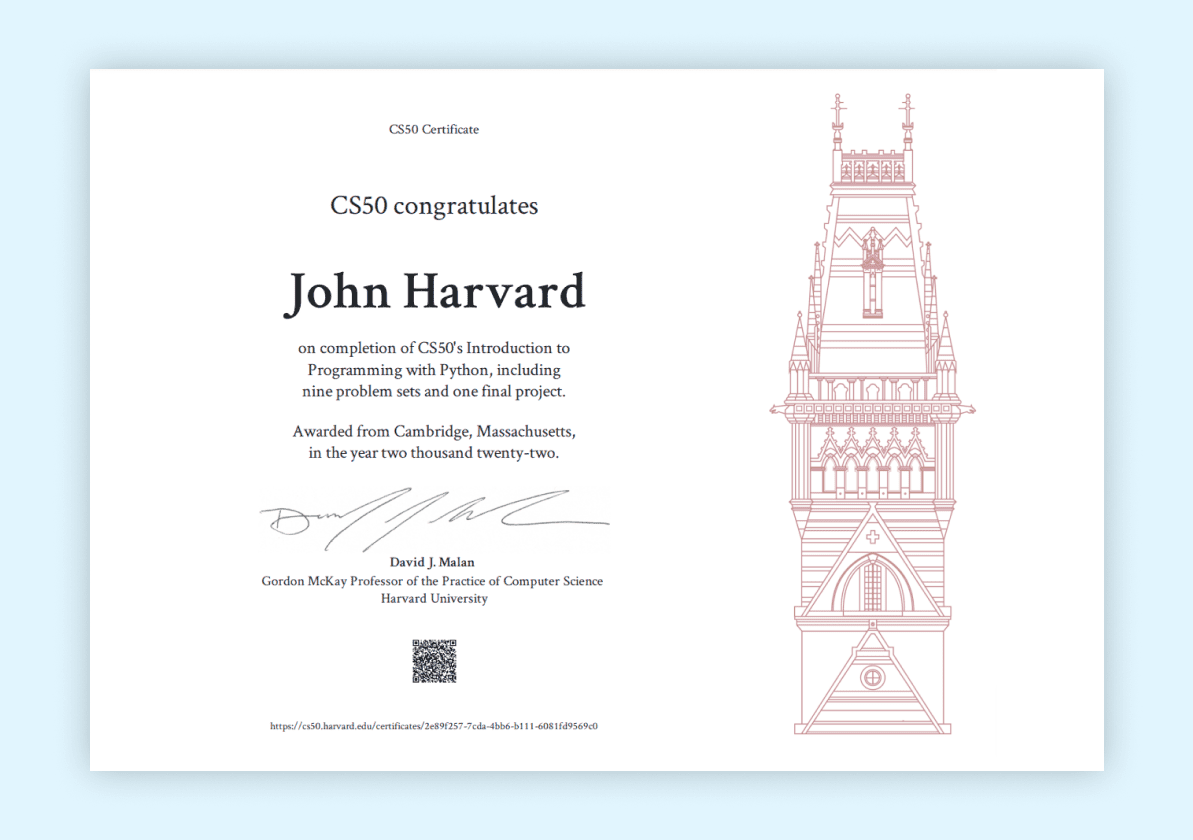
In 2022, Harvard launched a new free online course: CS50P, Harvard’s Introduction to Programming with Python.
This course is taught by Prof. David Malan, who also instructs Harvard’s Introduction to Computer Science, a course featured on Class Central‘s list of Best Online Courses of All Time.
The Python course shares many of the same strengths as its Computer Science counterpart: a comprehensive curriculum, numerous coding assignments, and even the opportunity to earn a free certificate of completion.
Now, let’s dive into an overview of Harvard’s Introduction to Programming with Python, and how you can earn a free certificate like the one above.
Approach
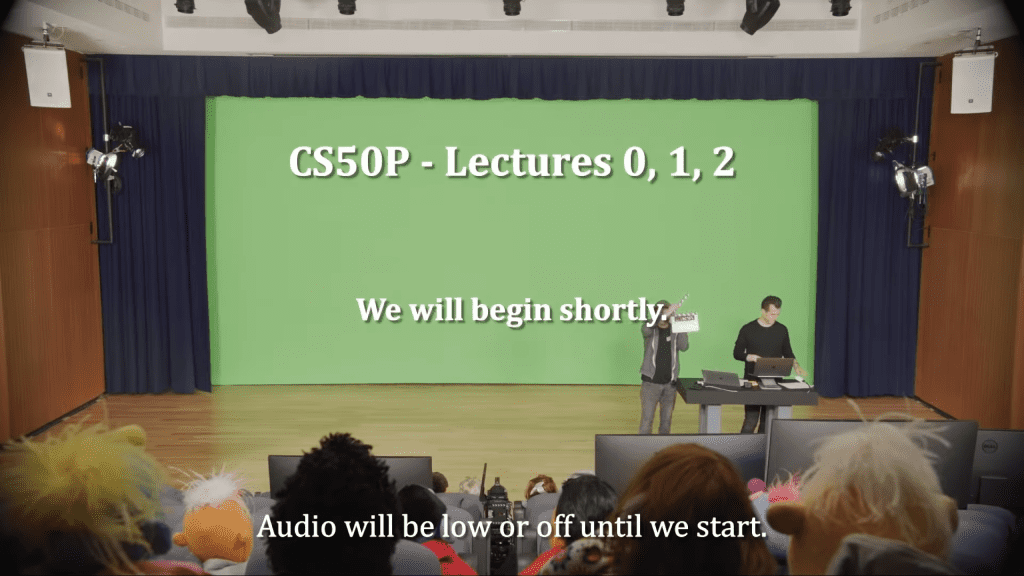
When I (Manoel) took CS50, I remember being impressed by how engaging it was. Most online courses simply involve an instructor talking into a camera or providing a voiceover for slides. While this can be an effective learning tool, it can be a bit dull…
CS50 was more like a show. Prof. Malan would pace the stage in front of a live audience, filmed from multiple angles, explaining concepts at a consistent yet easy-to-follow pace, live-coding his way through examples, and taking student questions.
This show-like approach led CS50, the most popular on-campus course at Harvard, to become one of the most popular online courses ever, with around five million learners. Fortunately, Harvard’s new Python course, CS50P, retains the same strengths.
Curriculum
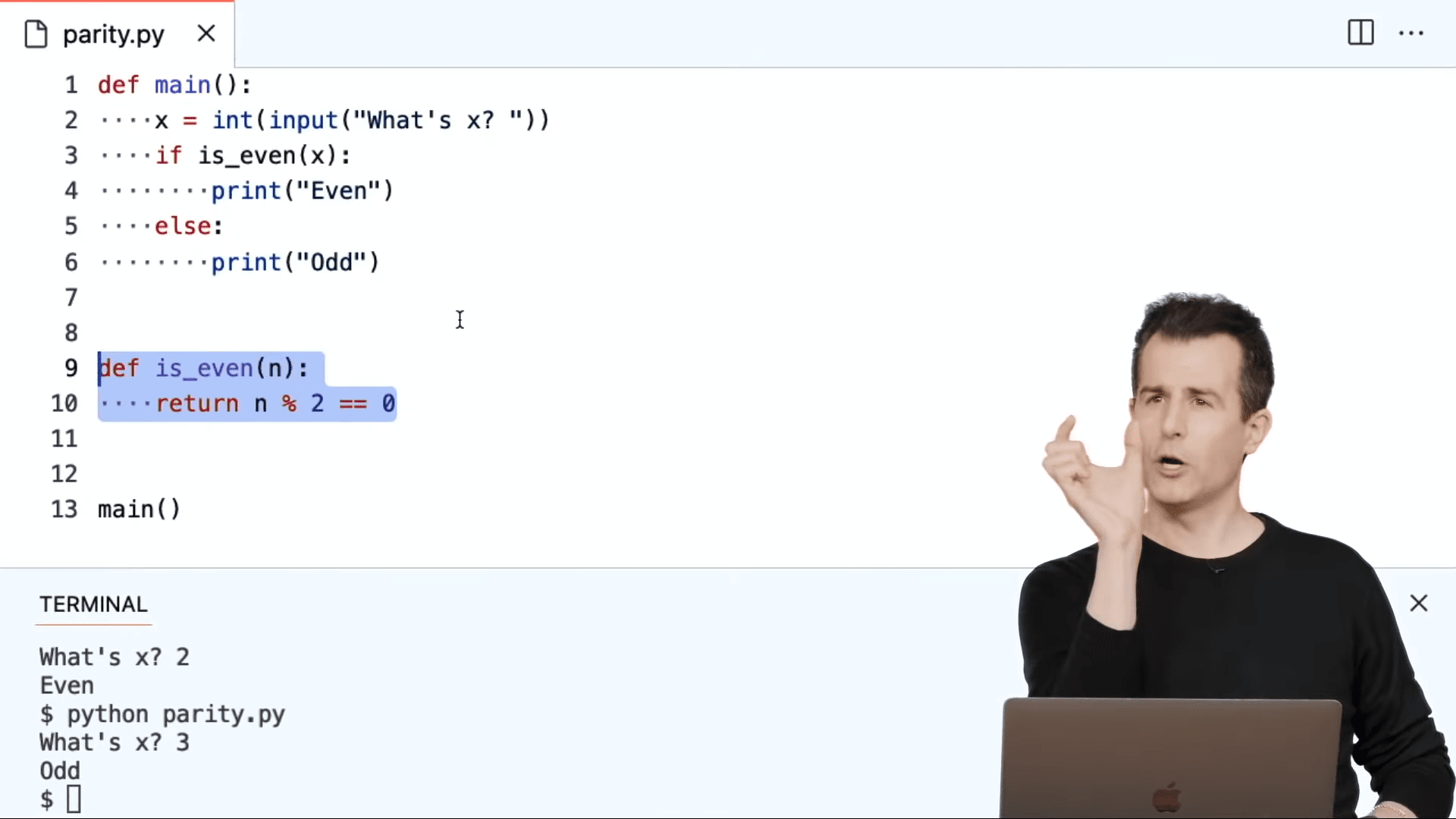
One of the great aspects of this new course is that it doesn’t have any prerequisites: it truly serves as an introduction to programming and Python, designed specifically for complete beginners.
The course runs over a period of 10 weeks, with the typical week consisting of a single 90-minute lecture and a problem set. And it hits the ground running. Within 20 seconds of the start of the first lecture, Prof. Malan will be introducing the most fundamental programming tool: the code editor.
In terms of content, the course is a rather comprehensive survey of Python programming. It starts with the basics, such as variables and conditionals, and works its way up the ladder of abstraction to discuss more involved subjects, such as object-oriented programming.
Among others, the course covers the following topics:
- Variables and data structures for storing them, such as lists.
- Conditionals, to to do different things when different conditions are met.
- Functions, to package programming logic and make it reusable.
- Loops, to run lines of code repeatedly — notably, over each element of a list.
- Libraries, to extend Python functionality via ready-made software packages.
In the final lecture, the course also touches on concepts that give Python character, such as list comprehensions, generators, lambdas, and tuple unpacking, to name a few.
By the end of the course, you’ll be able to confidently say that you know how to program in Python.
Assignments
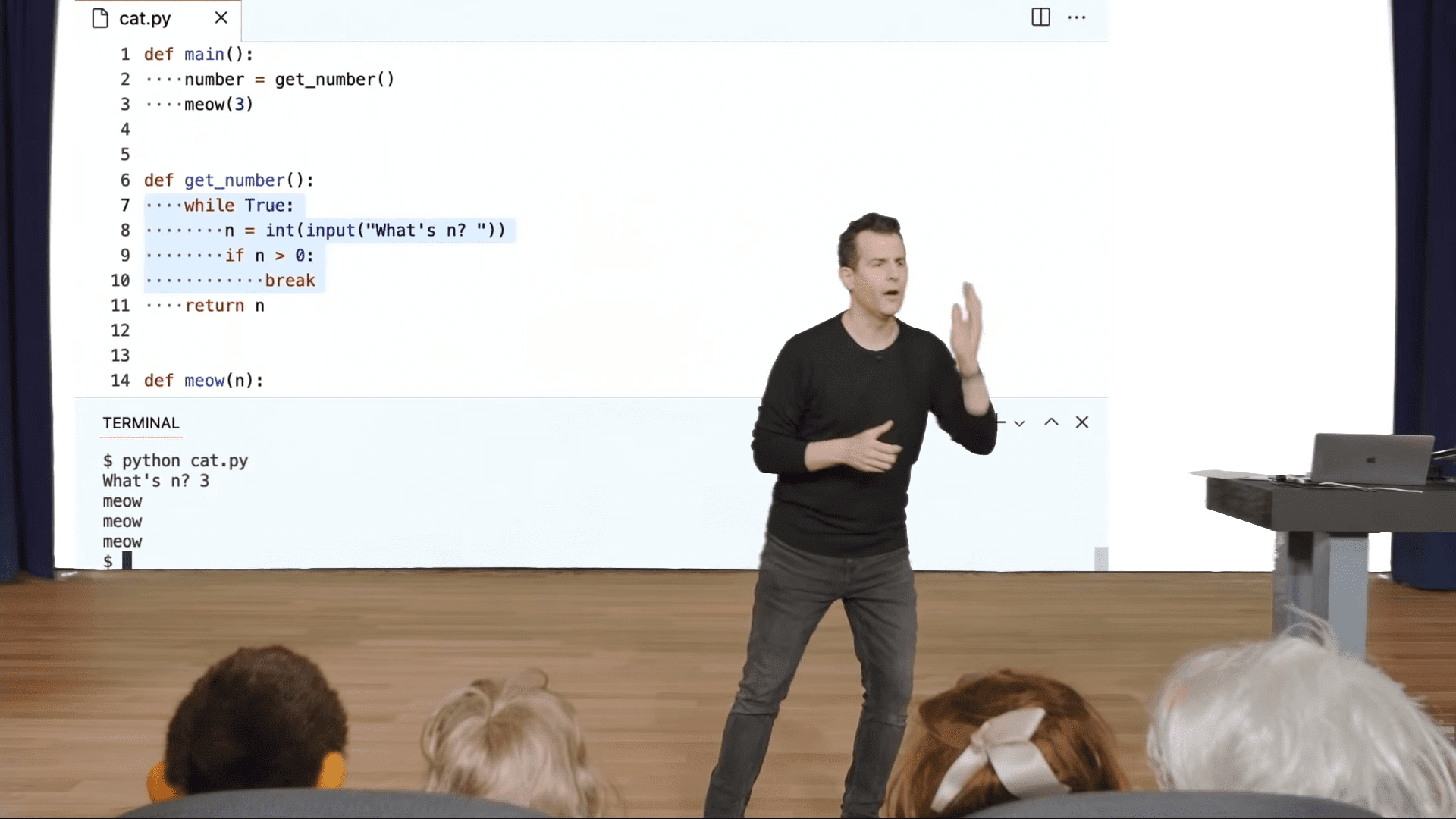
But knowing a language conceptually is one thing. Being able to put it into practice is another. That’s why coding assignments are essential. But in my experience, that’s an aspect that many online course don’t cover well.
Coding assignments are often behind a paywall. Sometimes, they’re available but require setting up a local environment. This can be tricky, especially if instructions are outdated, which isn’t rare, because software keeps evolving but many courses run on “autopilot”.
Harvard’s Python course cuts through that by letting learners access all the assignments for free and conveniently complete them through an in-browser code editor. The assignments take the form of weekly problem sets designed to contextualize and reinforce the concepts learned throughout the week.
Problem sets typically involve five or so problems, allowing you to put into practice different facets of Python. Among others, the course includes the following problems:
- Unit testing: Writing tests to preempt or eliminate bugs in your programs.
- Data processing: Creating a program for reading and formatting a text dataset.
- Form validation: Using regex to validate forms, like websites often do.
- PDF generation: Generating PDF files programmatically with images and text.
- Class definition: Fleshing out a class modeling a cookie jar and its interactions.
This last problem is a playful way of practicing OOP, a popular programming paradigm that you’ll likely want to further explore. I think that’s one of the main strengths of this Harvard course: it will prepare you to tackle more advanced courses, about Python and beyond.
Finally, in the last week of the course, you’ll tackle an open-ended Python project.
Free Certificate: How to Earn One
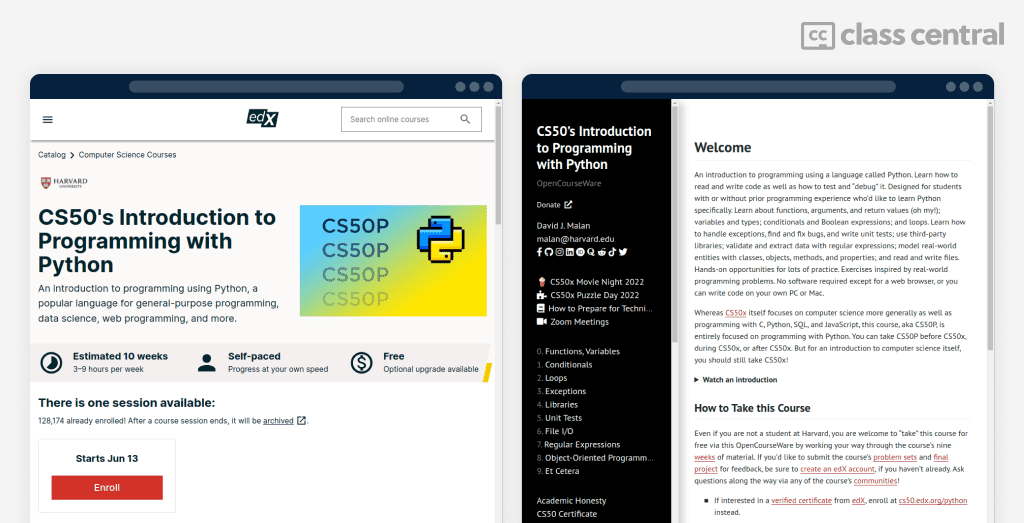
Years ago, upon finishing a course, you’d often receive a free certificate of completion. But in their quest for profitability, online course platforms stopped offering free certificates, favoring paid alternatives. In my experience, free course certificates are very rare nowadays.
Fortunately, Harvard’s Python course goes against the grain. Besides being entirely free in terms of learning content, it also offers a free certificate of completion. But figuring out how to earn the free certificate can be confusing, because the course is offered via two platforms:
- EdX: This is the platform many of you will be familiar with. But edX hasn’t offered free certificates in a while. Instead, when you enroll in the course on edX, you’ll be given the option to purchase a verified certificate for $299.
- Harvard OpenCourseWare (OCW): This is the platform set up by Prof. Malan and his team, where you’ll get a free certificate once you complete the course.
Note that the course on Harvard OCW and edX are exactly the same, including all the assignments. The only notable difference is that on Harvard OCW, the certificate is free and doesn’t require ID-verification.
To unlock the free certificate, here’s what you need to do:
- Go to the CS50P page on Harvard OCW.
- Complete each week’s coursework — in particular:
- All problem sets with at least 70%.
- The final project with at least 70%.
- Unlock your free certificate.
Note that on Harvard OCW, you won’t need to enroll in the course per se. Lectures are readily available. Instead, you’ll set up an account with edX and a CS50 account via GitHub to submit your assignments, see your grades, and unlock your certificate. Don’t worry, it’s a one-time setup, and it’s all explained in the first assignment, Problem Set 0. It’s a little confusing, because when you’re on edX, you may see the paid certificate offer. Simply disregard the paid option if you want the free unverified CS50 certificate.
More Courses

If you don’t find what you need in the course list below, browse Class Central’s catalog of 250K courses or visit our thematic collections:
- 10 Best Python Courses for 2024
- 10 Best NumPy Courses for 2024: Efficient Scientific Computing
- Massive List of Thousands of Free Certificates & Badges
- 1200+ Free Computer Science Courses from World’s Top Universities
- 900+ Free Developer and IT Certifications
- Harvard Computer Science Courses with Free Certificate
You can find all the Class Central free certificate articles here.
Tags







Yusufjon
This project is very good to reach your targets depending on IT programmer and artificial intelligence as well . I’m really keen on python programming language it is easy to write better and fast I.m happy for this project because of the owner of this project is organised
Fulgencio
I am in East Africa. I am interested in this certification Python program. I really interested. How can I go about it in those 9 weeks? What do I need? When is it starting?
Manoel Cortes Mendez
There are no prerequisites besides having a computer and internet connection, and there’s no start date: you can start at any time.
On Harvard OCW, in the left sidebar, you can simply go week by week. There’s one lecture and one problem set per week. Here’s the first lecture:
https://cs50.harvard.edu/python/2022/weeks/0/
Eric Hrahsel
Impressive!. Thanks for the tip.
Raktim
In reality they don’t offer free certificate at all. For certificate they recommend to opt for edx course. Please correct your fact.
Manoel Cortes Mendez
EdX offers a paid verified certificate. Harvard OCW offers an unverified certificate that is entirely free. The course is the same. It’s explained in the last section of the article:
https://www.classcentral.com/report/harvard-cs50-python/#free-certificate
You can also find information about the free certificate on Harvard OCW:
https://cs50.harvard.edu/python/2022/certificate/
Vincent Bob Tambo
So in short no verified free certificate from harvard??
Manoel Cortes Mendez
Correct. There’s a free certificate and a paid certificate. Only the paid certificate is “verified” — that is, it entails ID-verification by edX.
Parrié
I just looked at the link you have for the OpenCourseWare and I don’t think this is available any longer. All the certificates on the page point to edX for the $199 Certificate.
Manoel Cortes Mendez
The free certificate is still available and the modalities to obtain it haven’t changed. You can find more details on Harvard OCW:
https://cs50.harvard.edu/python/2022/certificate/
Marcin
Should we see 2023 version soon? I’m wondering if worth to wait or just start now with the 2022 version?
Manoel Cortes Mendez
The CS50 team always updates its courses on January 1st. But not all courses are updated annually. Since we’re already in February and the Python course hasn’t changed, I wouldn’t expect it to change in 2023. So I wouldn’t wait to get started.
Lejay
Failed to access the OCW site, I don’t think it’s available
Manoel Cortes Mendez
It’s available here: https://cs50.harvard.edu/python/
Fagbemi Joseph
How can I register for java course and get certificate
Manoel Cortes Mendez
Unfortunately, CS50 doesn’t offer a Java course. You can find some good Java courses at the following link, including one with a free certificate:
https://www.classcentral.com/report/best-java-courses/
Sakshi
Do we need to sign up for the course on https://cs50.harvard.edu/python/2022/
Or do we just need to watch the lectures and make submissions via edX to be eligible for a free certificate? I am not able to find how to sign up/ create an account on the website you mentioned that offers a free cetificate
Manoel Cortes Mendez
You don’t need to sign up, per se. You’ll simply need a free edX account and a free GitHub account. You’ll submit your assignments through GitHub. Each assignment has submission instructions – for instance: https://cs50.harvard.edu/python/2022/psets/0/#what-to-do
Sakshi
Okay thank you so much
Could you please tell from where & how you completed your online bachelor’s in cs from an open university? was it free or how much did it cost? and how you got into georgia tech?
Actually, I want to pursue a master’s in financial engineering/ quant finance however my bachelor’s in commerce isn’t eligible so I need to do some bachelor’s or master in maths/cs/econ before
Manoel Cortes Mendez
I wrote about my OU experience here: https://www.classcentral.com/report/open-university-insiders-perspective/ It adresses all your questions.
If you’re alluding to WorldQuant’s (WQ) master’s degree, while it is free, you should know that it isn’t accredited to the same extent as a regular, US degree, which may or may not matter to you depending on your goals. You can read more about US accreditations here: https://www.classcentral.com/report/us-accreditations/
Unfortunately, I don’t know any online degree that is both fully-accredited in the US and free or very low cost. But if you’re ok with a more limited type of accreditation, then University of the People (UoP) offers low cost degrees with DEAC accreditation, which is the same accreditation WorldQuant has.
I strongly recommend reading about accreditations first though, because the UoP and WQ’s accreditation has important limitations. For instance, a bachelor’s degree from UoP wouldn’t be recognized by Georgia Tech for admission into their master’s degree programs.
Sofia
Hello!
I found this course recently and thought it was very interesting to start learning once and for all programming. I was wondering some things so I thought I could ask you…
So if I understood right the free certificate is different from the paid certificate from edX, like one is validated and the other one not. But, how does that affect your certificate? Because in both of them there is your name and that you have completed the course right? The thing is I might need the certificate to have proof for furhter studies so I need to know if the unvalidated certificate is still useful.
Thank you for your time!
Manoel Cortes Mendez
Yes, the paid edX certificate is “verified” in the sense that it requires you to submit proof of identity. The free certificate doesn’t require that. Regarding assignments, both have the same requirements, and both certificates include a verification URL, if that matters.
https://www.edx.org/verified-certificate
Note that neither of these certificates carries academic credit, so I doubt either would be “formally” considered for further studies. They certainly show proactiveness and perhaps preparedness, but as far as I know, when it comes to satisfying entry requirements for formal studies, past academic transcripts with credit are usually required.
sofia
Thank you!! It’s more clear now and the credits thing makes sense so thanks :))
Ricardo
HI Manoel,
Is very confusing about the free certificate and I see lots of confusion from other people as well. According to what you saying: ” Harvard OpenCourseWare (OCW): This is the platform set up by Prof. Malan and his team, where you’ll get a free certificate once you complete the course ” but once you click in there it prompt you to go to EDX which makes very very confusing. Can you please verified if the Free certificate is accurate ? or how to obtain a free certificate. Thank you
Manoel Cortes Mendez
The information above remains accurate. The banner you saw is there to tell users that, if they want the paid verified certificate, they should go to edX. The free certificate is available on the Harvard OCW website, upon completion of all the assignments. You can find confirmation and more information here: https://cs50.harvard.edu/x/2023/faqs/#whats-the-difference-between-a-verified-certificate-and-a-cs50-certificate